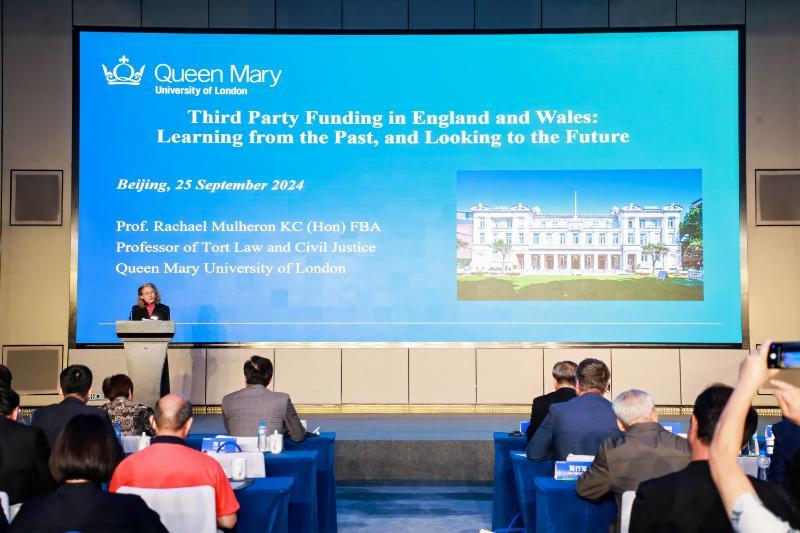
Funding justice: Queen Mary academic fights for crucial reform to UK law
Funding justice: Queen Mary academic fights for crucial reform to UK law
At a glance
-
In 2023, a controversial ruling by the UK’s Supreme Court suppressed a vital source of finance for legal cases: third-party funding.
-
Nine years earlier, law research at Queen Mary University of London foresaw a potential problem with legal fees legislation that could damage the third-party funding industry -and prevent people from taking their cases to court.
-
This potential problem is now a reality following the 2023 ruling, with the UK’s third-party funding industry plunged into disarray.
-
Work is now underway to pass a Bill that would reverse the effects of the Supreme Court’s decision.
How a Supreme Court ruling reshaped legal finance
In many cases, justice only occurs thanks to financial support from third-party funders. These commercial organisations typically cover litigants’ legal costs in return for a share of the proceeds.
The sub-postmasters’ action against the Post Office in the Horizon IT scandal is just one high-profile case that could not have been brought without third-party funding.
However, in 2023, a decision by the UK’s Supreme Court changed the landscape. The PACCAR ruling said that, in specific cases, a funder’s agreement with its client – known as a litigation-funding agreement (LFA) – could be classified as another type of contract: a damage-based agreement (DBA).
In 2014, Professor Rachael Mulheron KC (School of Law) predicted that such a re-classification would create financial uncertainty in the legal sector and potentially restrict access to justice for individuals and small businesses.
Her work has been instrumental in persuading the Ministry of Justice that the Supreme Court’s decision should be reversed.

Research
Mulheron has researched third-party funding since 2009. In a 2014 Cambridge Law Journal article, she responded to a 2013 UK government decision on lawyers’ fees. She saw that the legislation could, unwittingly, allow LFAs to constitute DBAs.
If that happened, an LFA would be unlawful and, in turn:
- restrict the arrangement’s viability
- complicate financial arrangements between the funder and the litigant
- cause legal disputes
Ultimately, allowing an LFA to be defined as a DBA would increase third-party funders’ uncertainty and foster their reluctance to fund cases, she wrote. Individuals and businesses would find it harder, and more expensive, to take legal action.

Reversing the Supreme Court’s decision
PACCAR made the problems Mulheron foresaw in her 2014 paper a reality. Mulheron has been active in the campaign to reverse the ruling as an academic consultant for the Association of Litigation Funders and by drafting memos to the Ministry of Justice and MPs, among others.
Drawing on her research, the memos provided the rationale for reform by stating the problems with re-classifying LFAs as DBAs.
This work helped lead to the Litigation Funding Agreements (Enforceability) Bill that proposes a reversal. The Bill entered the House of Lords for debate in March 2024
Mulheron is now collaborating with the Association of Litigation Funders, policymakers and present and past MPs. Their aim: to focus the new Labour government’s attention on re-introducing the Bill and pass it into law. Parliament effectively abandoned the Bill upon the early calling of the General Election in May 2024. Mulheron proposes legislative options for reversing PACCAR in a new analysis.
Supporting a healthy legal sector for the UK
As predicted by Mulheron’s research, PACCAR had the immediate impact of making third-party funders nervous about financing legal cases.
Overnight, PACCAR rendered their existing funding agreements with clients unlawful because they did not comply with the DBA legislation. Former clients could potentially demand their money back. Present clients had to renegotiate their LFAs.
If Parliament passes the Litigation Funding Agreements (Enforceability) Bill, PACCAR will be reversed and third-party funders will have greater confidence to fund cases, enabling more individuals and businesses to access justice.
This would further safeguard the UK legal profession by avoiding a downturn in legal work and by preserving the UK’s reputation on the global stage.
The UK is the second-most active legal market in the world (after the US). But without adequate funding and legal resources here, litigants may take their cases (whether litigation or arbitration) to other countries where they can.
Key takeaways
-
People cannot access justice if civil procedure is cumbersome, expensive or unworkable. Queen Mary research from Rachael Mulheron aims to achieve efficient procedures and workable funding, so as to expand access to justice.
-
The research further seeks to protect the legal sector’s vitality and preserve the UK’s position as the premier destination to do legal business. Legal services is one of the UK’s most important industries. It contributes around 3% of the country’s Gross Added Value and is a net exporter of services (PWC, 2022).
